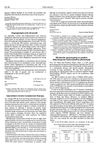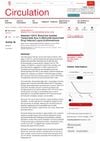 16 citations,
May 1982 in “Postgraduate Medical Journal”
16 citations,
May 1982 in “Postgraduate Medical Journal” Minoxidil can cause pericardial and pleural effusions with high protein content.
 15 citations,
September 1992 in “The Lancet”
15 citations,
September 1992 in “The Lancet” Stopping minoxidil caused significant hair loss, but regrowth occurred after resuming use.
 11 citations,
May 1990 in “Journal of Dermatological Science”
11 citations,
May 1990 in “Journal of Dermatological Science” Diazoxide applied to the skin can increase hair growth without harmful side effects.
 6 citations,
January 2021 in “Journal of The American Academy of Dermatology”
6 citations,
January 2021 in “Journal of The American Academy of Dermatology” Low-dose oral minoxidil can be effective for hair loss but should be avoided in people with certain heart conditions and severe liver problems.
 5 citations,
December 2006 in “Annals of the New York Academy of Sciences”
5 citations,
December 2006 in “Annals of the New York Academy of Sciences” Minoxidil boosts hair growth by undergoing a process in hair follicles and certain skin cells, and by increasing the production of compounds essential for hair growth and maintenance.
 4 citations,
October 1990 in “The Lancet”
4 citations,
October 1990 in “The Lancet” Minoxidil might cause blood vessel-related skin lesions when applied to the scalp.
3 citations,
August 2022 in “Molecules/Molecules online/Molecules annual” A new strain of bacteria from the human skin can help prevent hair loss.
1 citations,
April 2018 in “Медицинский совет” Minoxidil effectively treats early-stage androgenic alopecia with visible results in 4-6 months and minimal side effects.
 February 2024 in “Cosmoderma”
February 2024 in “Cosmoderma” Low-dose oral minoxidil can help treat male and female pattern hair loss, especially in those who can't use topical treatments or have heart health issues.
 June 2023 in “Drugs & Therapy Perspectives”
June 2023 in “Drugs & Therapy Perspectives” New treatments for male pattern hair loss look promising, but established treatments are still the main option.
September 2022 in “Health and Medical Journal” Minoxidil and oral antioxidants helped improve hair growth in a patient with hair loss due to lupus.

COVID-19 may be linked to hair loss called Telogen Effluvium, affecting quality of life and self-esteem.
April 2011 in “The FASEB Journal” Topical Minoxidil is cost-effective for managing baldness but requires continuous use.
 November 1991 in “PubMed”
November 1991 in “PubMed” Minoxidil, a topical solution, was found to slow balding in most cases and increase hair density in some, but only a few saw significant cosmetic improvement.
January 2023 in “Revista Ibero-Americana de Humanidades, Ciências e Educação” Combining Finasteride and Minoxidil effectively treats hair loss in middle-aged men.
 39 citations,
November 1984 in “Journal of Cardiovascular Pharmacology”
39 citations,
November 1984 in “Journal of Cardiovascular Pharmacology” Minoxidil lowers blood pressure, increases heart rate, and improves blood flow in dogs.

Oral Minoxidil could be a safe and effective alternative treatment for various non-androgenic alopecias.
 November 2019 in “Actas Dermo-Sifiliográficas”
November 2019 in “Actas Dermo-Sifiliográficas” Oral minoxidil helps treat hair loss and has reversible side effects.
 November 2023 in “Circulation”
November 2023 in “Circulation” Minoxidil can cause a rare but serious condition that leads to fluid buildup around the heart and drug-induced lupus.
 26 citations,
June 1983 in “Journal of Hypertension”
26 citations,
June 1983 in “Journal of Hypertension” Minoxidil lowers blood pressure more effectively but has more side effects, so try hydralazine first.
 December 2023 in “Farmateka”
December 2023 in “Farmateka” Minoxidil is an effective and safe treatment for common hair loss when applied to the skin, but more research is needed for optimal use.
 22 citations,
January 1979 in “JAMA”
22 citations,
January 1979 in “JAMA” Minoxidil can lower blood pressure effectively and safely in emergencies.

Minoxidil helps stimulate hair growth and enlarge small follicles in common hair loss, but doesn't stop it, and its effects can be boosted when combined with finasteride.
 109 citations,
July 1984 in “Circulation”
109 citations,
July 1984 in “Circulation” Minoxidil helps heart function but doesn't improve exercise ability and may cause complications.
 57 citations,
January 1980 in “Journal of Cardiovascular Pharmacology”
57 citations,
January 1980 in “Journal of Cardiovascular Pharmacology” Minoxidil treats high blood pressure and side effects can be managed.
 50 citations,
September 1975 in “American Heart Journal”
50 citations,
September 1975 in “American Heart Journal” Minoxidil effectively controls blood pressure in severe cases, but may cause fluid retention and edema.
 48 citations,
June 1988 in “PubMed”
48 citations,
June 1988 in “PubMed” Minoxidil sulfate relaxes muscle by increasing potassium flow, making it a unique muscle relaxer.
18 citations,
January 1976 in “Drugs” New treatments improved blood pressure control in patients with resistant hypertension.
 November 2023 in “Current Dermatology Reports”
November 2023 in “Current Dermatology Reports” Oral minoxidil is effective for various hair loss types and may improve male sexual function, but aspirin can reduce its effectiveness.

Isotretinoin and tazarotene help treat acne, while minoxidil and finasteride promote hair growth.
























